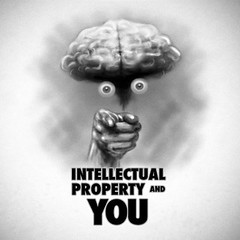| Intellectual Property and YOU (Photo credit: Thomas Gehrke) |
Volume 0 NCSCBHEP Proceedings 2008 Article 36
11-16-2012
New Paradigms for Instruction: Impact onCollective Bargaining, Intellectual Property Rights
James Castagnera
Rider University
Follow this and additional works at: http://thekeep.eiu.edu/jcba
Recommended Citation
Castagnera, James (2008) "New Paradigms for Instruction: Impact on Collective Bargaining, Intellectual Property Rights," Journal of
Collective Bargaining in the Academy: Vol. 0, Article 36.
Available at: http://thekeep.eiu.edu/jcba/vol0/iss3/36
This Proceedings Material is brought to you for free and open access by The Keep. It has been accepted for inclusion in Journal of Collective Bargaining
in the Academy by an authorized administrator of The Keep. For more information, please contact tabruns@eiu.edu.
1
Comments by Dr. James Ottavio Castagnera
Associate Provost and Associate Counsel
Rider University, Lawrenceville & Princeton, NJ
. Panelist, “New Technology: New Paradigms for Instruction. Impact on Collective Bargaining,
Intellectual Property Rights,” 35th Annual National Conference on Collective Bargaining in
Higher Education and the Professions, Baruch College, CUNY, April 8, 2008.
Introductory Remarks
“The concept of intellectual property is almost dead thanks to the Internet” (Khanna, 2004).
That grim statement can not be ignored. The Internet has changed our world enormously,
opening new doors of communication and access to knowledge. Such privilege does not come
without responsibility, as the degree to which it can be taken advantage of is enormous. The idea
of intellectual property is to treat knowledge like private property, using copyrights, trademarks
and patents to enforce the notion.
Some see turning intellectual property into private property as an “enclosure of the
commons” hindering the advancement of science and democracy (Monaghan, 2005). On the
other hand, one of the first statements of fair use dates back to the Talmud. It is written that a
person “who reports something in the name of the one who said it brings redemption into the
world" (McLemee, 2004). As interpreted by Rabbi Joseph Telushkin, the statement means that
when a person fails to accredit a piece of information, he/she uses it for personal gain. When
properly accredited, the information expands everyone’s knowledge (McLemee, 2004).
This is one of the main arguments behind the ethical issue of plagiarism. Unlike copyright
infringement, plagiarism includes more than directly copying a passage—it involves appropriating
another person’s idea as one’s own. Copyright law enforces economic interest, the violation of
which can result in judicial punishment; plagiarism enforces personal and ethical interest and will
rarely go beyond the dean’s office. While one may not go to court for plagiarism, it can be
punished severely at the higher education level. (McLemee, 2004)
In the past, one associated bootlegged films with poor sound quality, off-center images and
the occasional silhouette of a fellow moviegoer coming in late. Today, movies still in theaters can
be found and downloaded online. The quality is high and the cost low. It is all a part of the
relatively new wave of digital piracy making entertainment industry CEOs sweat. The potential
loss of profit has demanded the involvement of the government, which has gone to great lengths
to crack down on illegal downloading. (Recording Industry Association of America, 2006)
The first online file-sharing program to receive significant attention from the Recording
Industry Association of America (RIAA) was Napster, in 1999 (“Filesharing”, 2005). Created by
college dropout Shawn Fanning, it was a peer-to-peer program. Peer-to-peer file sharing services
are especially fast and efficient for downloading audio and video files because they depend on
the computing power of users, not the server. Multiple files can be downloaded from multiple
locations without the large amount of traffic slowing the server down. (“Peer-to-peer”, 2007)
The legal battle that ensued between Napster and the RIAA resulted in Napster 2.0 and the
current Napster To Go. Napster To Go offers over 3 million downloadable songs for a monthly
rate. (“Filesharing”, 2005) The compromise was a victory for the RIAA. Grokster, a similar peerto-
peer program, was shut down after a Supreme Court decision in June 2005. The case was
reminiscent of Sony Corporation of America v. Universal City Studios, Inc. in which the Supreme
Court’s decision ensured that VCRs, CD burners, iPods and all other technology capable of
copyright infringement may be produced and sold by their respective companies without facing
lawsuits. With the Grokster decision came not a negation of the former verdict but a new set of
guidelines based on the idea of ‘inducement’:
"[O]ne who distributes a device with the object of promoting its use to infringe copyright, as
shown by clear expression or other affirmative steps taken to foster infringement, is liable for the
resulting acts of infringement by third parties." (MGM v. Grokster, 125 S. Ct. 2764 (U.S.
Supreme Court, June 2005)
The recent Internet file-sharing cases have created a lot of grey areas. For higher education
institutions, this is an important issue because universities have been heavily targeted by the
RIAA and the MPAA (Motion Picture Association of America). These organizations have found
that a large percentage of illegal downloading takes place on college campuses. Schools with
high-bandwidth networks can be especially popular targets; lawsuits have been filed against
hundreds of students for copyright infringement, and the pressure on colleges to police their own
campuses is great. (Brock and Young, 2006; Morris, 2006)
It is not hard to imagine that many university IT administrators are becoming frustrated and
overwhelmed by the RIAA/MPAA’s demands. The task of monitoring an entire campus network is
no small one, and not necessarily associated with the normal responsibilities of university
administration. There have even been complaints against the RIAA/MPAA and the overly extreme
measures they’ve gone to, such as the prosecution of what in the past would have been deemed
fair use. (Read, 2006) Nonetheless, with the government behind them, these ultimatums must be
honored to a reasonable degree, no matter how unclear the notion of ‘reasonable’ may be.












No comments:
Post a Comment